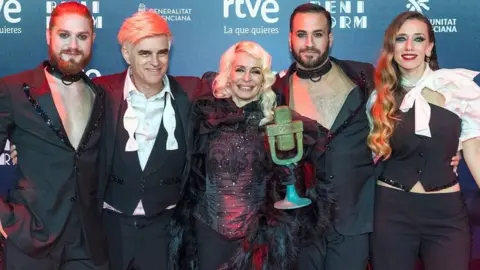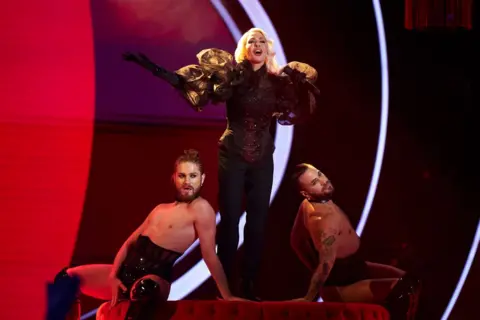Spain's prime minister defends Eurovision entry
Warning: This article contains language that some readers may find offensive.
 RETV
RETVSpain's Prime Minister, Pedro Sánchez, has defended the country's Eurovision song after it was branded "anti-women".
The electro-pop anthem Zorra has come under fire because its title, which means vixen, is more often used to mean "bitch" or "slut" in Spanish slang.
The song "insults women in a sexist way", said the Feminist Movement of Madrid in a statement.
But Mr Sánchez dismissed the criticism, saying the song challenged sexist stereotypes.
"It seems to me that feminism is not only fair, it can be fun, and this type of provocation must come from culture," he told the Al Rojo Vivo programme on La Sexta television.
Zorra is performed by Nebulossa - a duo formed by María "Mery" Bas and Mark Dasous, from the village Ondara in Allicante.
They have been married for 20 years and raised two children before forming their band in 2018.
Nebulossa were chosen to represent Spain in a televised competition last weekend, after beating contestant Jorge González by just two votes in a public vote. (González ultimately came fourth, after jury votes were included. St Pedro and Angy Fernández placed second and third respectively).
'Absurd lyrics'
Their song has already become a viral sensation, with more than 2.5 million views on YouTube, and the couple said they were taken aback by their success.
"We didn't do this with the intention of it being an anthem," they told Spain El Pais newspaper. "People have adopted it as such and that is the best thing that can happen to an artist. It happens to very few."
Translated to English, Zorra's lyrics read: "If I go out alone, I'm the slut / If I'm having fun, I'm the sluttiest / When I get what I want - Bitch, bitch / It's never because I deserve it."
The song is intended as a commentary on misogyny and the double standards that women face. If a man is called a zorra, it simply means "rascal".
But the Feminist Movement of Madrid said it was "absurd" to argue that "insistently repeating" the word could "empower" women.
The group previously made headlines when they split from Spain's main feminist movement, the 8M Commission, over its support for trans rights legislation, and later organised a separate march for International Women's Day.
 Getty Images
Getty ImagesSpain's equality minister disagreed with their statement, calling Zorra a "fun song, which breaks stereoypes".
The prime minister went further, suggesting the criticism was a product of the right-wing "fachosphere".
"They would have preferred for it to have been the Cara al Sol," Mr Sánchez said, referring to the anthem of the Spanish falangist movement. "But I like having this type of song more."
The EBU, which organises Eurovision, has confirmed the song does not contravene its ban on lyrics that could bring the contest into disrepute.
"The EBU understands that the title of the song... has many meanings," it said in a statement.
"Considering the context of the lyrics and the message... we have concluded that the song is eligible to take part in the competition."
Meanwhile, Nebulossa's singer brushed off the criticism.
"We are not 20 years old," she told Spanish reporters. "I don't give a damn about anything."
The Eurovision Song Contest will take place in Malmö, Sweden, this May.
The UK will be represented by former Years & Years singer Olly Alexander, who revealed the first snippet of his entry, Dizzy, on Wednesday.
